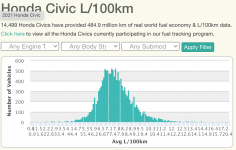View attachment 46254
If you pick the middle of the bell curve it's actually 7.5.
And a Volt doesn't use 21kw to go 100km, on average. Heck, my 2011 will go 60KM in the summer without much effort on around 10kw.
Yes, there variables including usage of HVAC and outdoor temperature, but that holds true for both ICE and EV vehicles. An EV may use 20% more battery in the winter, but people often forget or fail to notice that their car may be using 40% more gas, particularly for short trips which is what the majority of vehicles are used for.
In the end, the break even points can be all over the map so trying to nail down one number versus another involves so many variables (including, as I mentioned, if a person has access to free charging at work or wherever - no ICE drivers have access to free gas stations) that it's impossible to narrow down exactly. If I was given access to a plug tomorrow at work for example, my operating costs would instantly go to zero for the average 50KM a day I drive. My BIL was in that exact situation for quite a while at a past job actually - access to a plug in the parking garage = $0 daily 90km commute.
Yes, EV's cost more to buy (at this point at least, but that gap is increasingly narrowing) but less to operate. We can all agree on that.
Beyond that, things get very fuzzy very fast depending on many variables that EV owners can flex that an ICE owner cannot.



















